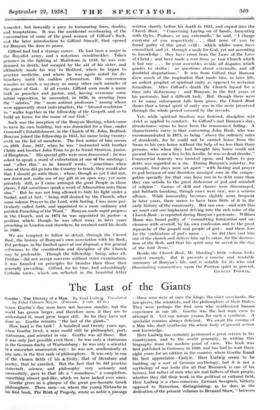The Last of the Giants
Goethe : The History of a Man. By Emil Ludwig. Translated by Ethel Colburn Mayne. (Putnam. 2 vols. £2 2s.) SINCE Goethe's day men have not become smaller, but the world has grown larger, and therefore men, if they are to understand it, must grow larger still. So far they have not done so. Goethe remains "the last of the giants."
How' hard is the task ! A hundred and twenty years ago, when Goethe lived, a man could still be philosopher, poet, statesman, and scientist in one. Goethe was all these. But it was only just possible even then : he was only a statesman in the German duchy of Wurtemburg : he was only a scientist in a somewhat amateurish way : he was not, academically at any rate, in the first rank of philosophers. It was only in one of the chosen fields' of his activity, that of literature and Poetry, that he excelled. But the fact that he did practise statecraft, science, and philosophy very seriously and successfully, gave to that life a "roundness," a completion, something almost god-like, -which we have lacked ever since.
Goethe gives us a glimpse of the great pre-So-erotic Greek Philosophers. These men—on whom the young Nietzsche in his first book; The Birth of Tragedy, wrote so noble aa, passage —these men were at once the kings, the chief merchants, the law-givers, the scientists, and the philosophers of their States. They were perhaps the first men who synthesized human experience in one life. Goethe was the last man even to attempt it. Yet our nature yearns for such a synthesis. A specialist remains always deficient. We await the coining of a Man who shall synthesize the whole body of present action and knowledge.
Herr Ludwig has certainly performed a great service to his countrymen, and to the world generally, in writing this biography from the modern point of view. The book was first published in Germany in 1920, and has had to wait these eight years for an edition in the country where Goethe found his best appreciator—Carlyle. Herr Ludwig seems to be building up a sort of German mythology, but it is not a mythology of war lords (for all that Bismarck is one of his heroes), but rather of men who are real fathers of their people, 'whether. they did their work in the political or cultural field. Herr Ludwig is a class-conscious German bourgeois, bitterly opposed to ICaiserism, distinguishing, as he does in the dedication of the present volumes to Bernard Shaw, " between
Potsdam and Weimar—the obsolete from the immortal Germany." His active and politic pen is, perhaps sub- consciously, but more probably with intention, bent on this task of cultural propaganda. He wishes to roll back the curtain on German history and point out the true sources of life, of inspiration, of greatness, in the succession of Goethe, Schiller, Lessing, of Wagner, Nietsche, Schopenhauer, and of Bismarck, too, for he is not so foolish as to deny the necessity of the iron man.
There is a revealing passage in the present volumes describing the meeting between Goethe and Napoleon—a meeting which has always fascinated him :—
" When, since Socrates had sat with Alcibiades at the Symposium, since Seneca had given counsel to his Emperor, had one speck of space, one little room, enclosed two human beings of such self- acquired authority ? Was this really possible, so recently as in the days of our grandparents—that two men should, in the course of a few decades, have made themselves legendary figures, have shaped spiritual dynasties—that two sons of the bourgeoisie, born as it were invisibly among a thousand more in the street of a town like any other town, should in that space of time have raised their mothers to such rank that one reigned as Empress-Mother at the Tuileries, and the other could enter a drawing-room on the majestic words; Je suis la mere de Goethe.'"
In this short paragraph is contained the quintessence of " Ludwigism," if we may be pardoned the barbarity of the expression. Here is his worship of genius. And that, after
all, is what has made Herr Ludwig, in spite of the cavillings of more academic historians, a great biographer. His some- what feminine nature has the necessary warmth and generosity
to abandon itself almost completely to the "starry souls" of his heroes. But note what kind of heroes he likes best. His
heroes must have "self-acquired authority." Nor must this authority be merely of this world. They must shape "spiritual dynasties." one recalls how in his Napoleon he
traces the whole downfall of the Titan from the fact that he was not content to found such a "spiritual dynasty," but attempted the gross and vulgar task of placing a second-rate dynasty in all the palaces of Europe.
The great German middle class is not to feel adrift and lonely because it has lost its Kaiser. Rather is it to stand squarely upon its own feet and breed up other leaders and guides from its own ranks. We have left ourselves little space to speak of the biography itself. Its methods will be familiar to readers of Herr Ludwig's other work. Needless to say, it is quick, stimulating, and attractive. The story is told from an exceedingly personal point of view. The text contains many portraits. The author permits himself many a speculation, by its nature unverifiable, into the thoughts and feelings of his hero in different periods of his life. But the result is that we feel that we really want to know something more of Goethe when we have read these pages. Herr Ludwig has created once again a figure which lives and breathes. What more do we ask of the biographer ?







































 Previous page
Previous page